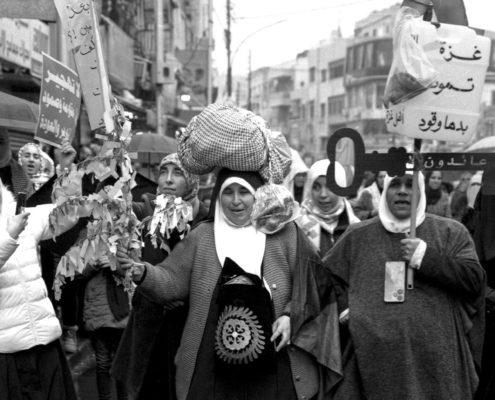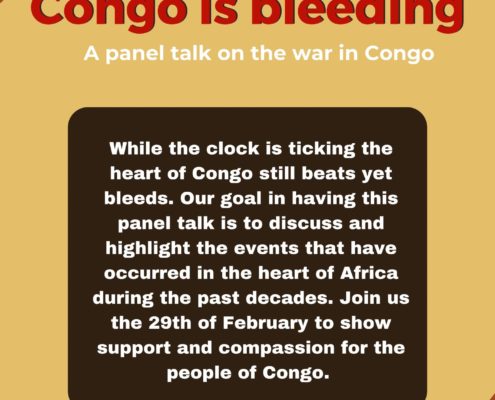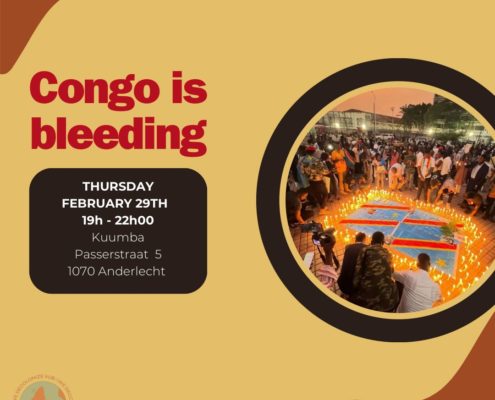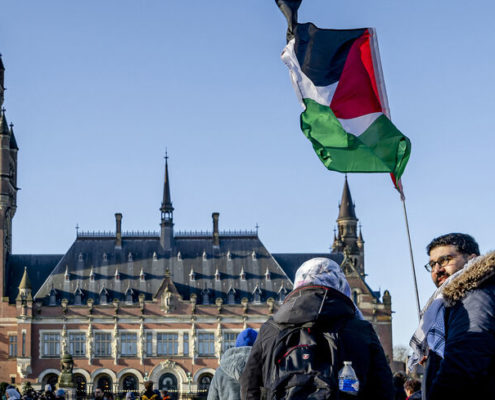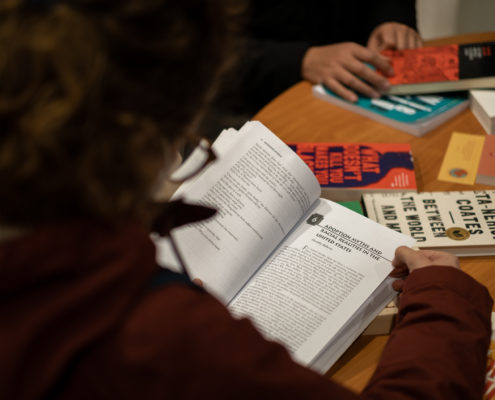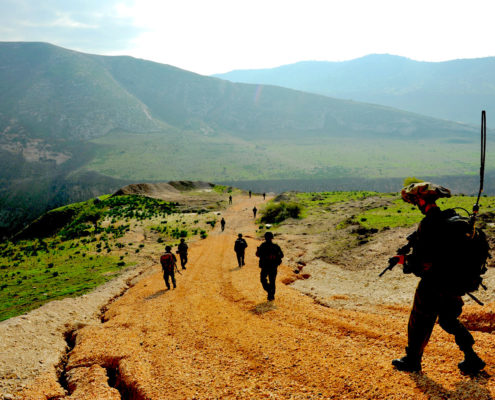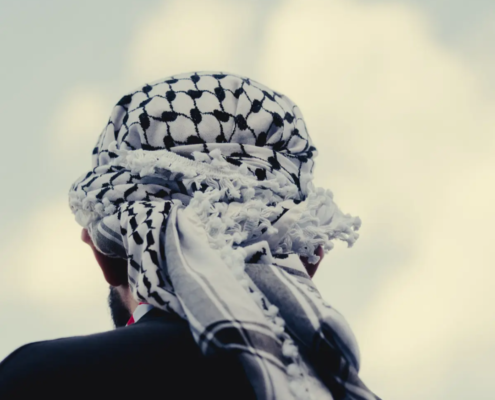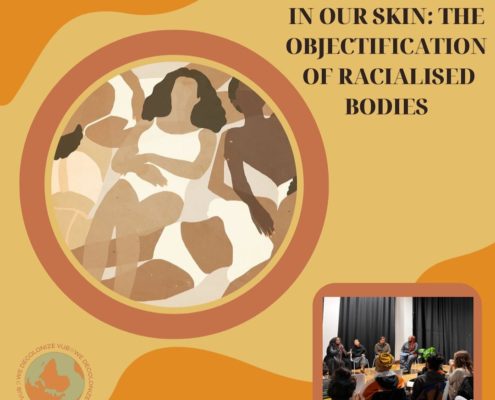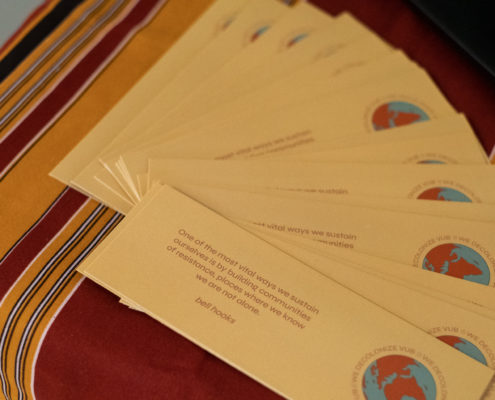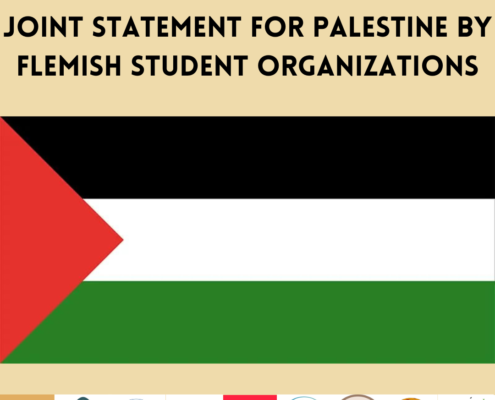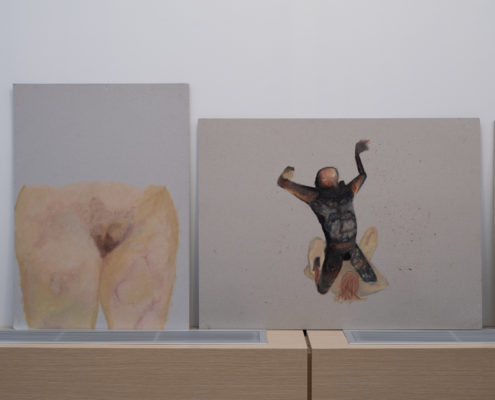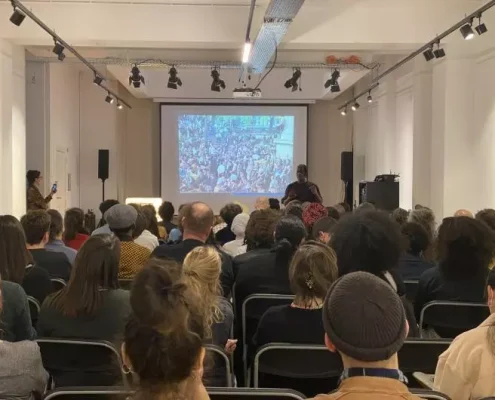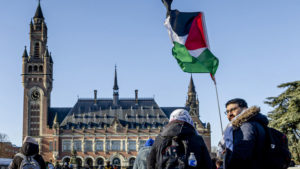
South Africa’s case at the ICJ promises to reshape the current world order
Ghassan Bardawil
26.01.2024
Today, the International Court of Justice (ICJ) will be delivering its ruling on the provisional measures requested by South Africa in Section I Article 6 of the Application Instituting Proceedings against Israel. While the conclusive ruling of the court on this case may not come for years, optimists point to the potential provisional measures as a realistic means to pressure Israel into de-escalation if not a ceasefire. The court’s announcement today is bound to alter the course of the conflict, but examining it more closely, the trial also seems bound to redefine the world altogether.
Getting a ruling from the court which would indicate provisional measures could have the potential to halt bombardment and alleviate some of the looming crisis awaiting Gaza, and would be a monumental leap on the march to freedom and recognition. But peeling back some of the wrapping around this trial, and examining some of its broader implications, it appears that as the world holds its breath while the ICJ judges are deliberating their indication, underlying the trial, the legitimacy of the contemporary international order is under extreme scrutiny. The ICJ ruling today, whichever way the court’s decision is made, will have implications that are bound to reform, if not overhaul, the way our global political structures work. Ultimately, the world we will go to sleep in tonight will be fundamentally different to the one we woke up in this morning.
Gaza; past the brink
The confirmed death-toll from Gaza’s Ministry of Health is above 25,700 since October 7th, these figures are certainly conservative as the MOH confirms casualty numbers through positive verification only. Projections by Euro-Mediterranean Human Rights Monitor estimate real deaths in the Gaza Strip surpassed 30,000 before the beginning of 2024. While unbelievably large, we should expect these numbers to be dwarfed by the ongoing and future casualties of secondary effects of the bombardment and invasion.
Since the imposition of the blockade in 2006, living conditions in Gaza have been strategically engineered to teeter at the edge of collapse primarily to serve the purposes of the Israeli security apparatus and its stakeholders. Gaza’s residents have been strategically kept on a calorie-counted “diet” living under the debilitating siege on movement of people and goods through an almost 20 year blockade. Regular Israeli airstrikes and military incursions, dubbed “mowing the grass” by Israeli policy-makers, were aimed at demoralizing Palestinian resistance through intermittent intensive bombing campaigns like Operation Cast Lead (2008-2009) and Operation Protective Edge (2014). The calculated, drawn out, deprivation of Gaza has kept its population perpetually on the brink of collapse and starvation.
“If there were 200 Israelis who were being killed every day, the US would just go in there militarily and say ‘this cant happen!’ If there was one Israeli woman who was getting a cesarean section without anesthesia, the US press would be up in arms. If there was one child in Israel who was getting their leg amputated without any kind of anesthesia, again, there would be headline news saying ‘how can the world allow this to happen’. So how can the world allow what is happening today? How can we be allowing our government to do this? … it is totally unconscionable and we have to do more to stop it.”
-Medea Benjamin; prominent Jewish american activist and co-founder of CodePink
Israel’s current assault on the Strip has sent conditions spiraling far beyond collapse: more than 85% of Gaza’s already over-crowded population have been displaced further south leading to unprecedented degree of congestion; at least 45% of all residential buildings in Gaza are destroyed beyond repair and over 60% of residential buildings are structurally damaged, leaving well over 1 million people homeless; key public institutions like the parliament building and recently constructed Palace of Justice have been decimated leaving little to no opportunities for Gaza to rebuild its civil society for years; all of the universities in Gaza have been systematically destroyed alongside the damage of over 90% of primary and secondary schools as well as the disproportionate killings of academics and teachers; record numbers of casualties among Journalists, UN aid workers, and health workers relative to any conflict in contemporary history; only 4 to 6 of Gazas hospitals are functioning out of a total of 40, all dangerously overcrowded and under-supplied, hosting surgeries and amputations regularly carried out on the floor without anesthetic or other necessities. The daily rate of killings by the Israeli military in Gaza has come to average at a rate of 250 Palestinians per day, more than double that of any other major conflict in the 21st century.
South Africa vs. Israel at the ICJ
It’s no surprise that South Africa, considering their historic struggle against apartheid, has stepped in to defend Palestine on the world stage. The experiences that define Palestinians’ lives under occupation are all too familiar to South Africans who can remember the apartheid regime; separation of public spaces and facilities, differentiation between identification (from passports and ID cards to vehicle license plates), brutal policing and violent oppression, and most certainly the notions of dehumanization and racial supremacy. South Africa’s long march has seared the right to resist for liberty and equality in the memories of South Africans, and in the hopes of Palestinians. Palestinian liberation movements across the spectrum learned and drew inspiration from their contemporaries in South Africa, from the non-violent cultural activism and boycott movements all the way to hard-line guerilla insurgencies. Having endured this same uphill battle to liberation, with few international allies along the way, the urgent parallels will not escape South Africa. “We know too well that our freedom is incomplete without the freedom of the Palestinians” Nelson Mandela famously said.
South Africa’s formal application to the ICJ instituting proceedings against Israel and request for the indication of provisional measures was submitted on the 29th of December 2023 and published alongside a formal press release from the court. The application accuses Israel of violations of its obligations under the 1949 Convention on the Prevention and Punishment of the Crime of Genocide with regards to its 2023-24 assault on the Gaza Strip.
The International Court of Justice, based in The Hague, was established by the 1945 UN Charter as one of the six principal organs that form the United Nations. Constituted and regulated by the Statute of the International Court of Justice, as specified by Chapter XIV of the UN charter, the ICJ is the only international court which adjudicates general disputes between nations and is as such considered to be the world’s highest legal authority. As the primary legal arm of the United Nations, the ICJ is deeply integrated into the fabric of the UN superstructure.
The court’s definitive ruling on whether or not Israel’s actions constitute a breach of the Genocide Convention is expected to take years. ICJ cases can drag under normal circumstances as the court is weighed down by the massive bureaucracy required to maintain it. Cases like this one have been exceptionally debilitating for international organizations in the past, and discussions regarding Palestine are prone to choke the mechanisms of these institutions.
The Hague approved South Africa’s request for an expedited case on 3 January. The prosecution was granted its hearing on 11 January to make its case for the indication of provisional measures. Israel’s defense would be scheduled for the next day and both hearings were extended by an hour at the request of the Israeli delegation.
Article 144 of the application instituting proceedings lays out the 9 provisional measures South Africa requested from the court. Broadly, the measures effectively call for a halt of military operations and demand an end to (and prosecution of) inciting violence and genocidal rhetoric, a weekly submission of reports from Israel to the court on all measures taken to comply with the measures and that the state desist from the extermination, displacement, and deprivation of Palestinians.
A world order on trial
Commendably, South Africa’s prosecution was conscientious of the on-the-ground futility of a distant future ruling and invoked their application with this in mind. While SA’s case is primarily based in a contentious dispute (the case of South Africa vs. Israel), the prosecution placed a great deal of focus on establishing a preliminary case for incidental jurisdiction from the court. A request for Provisional Measures of Protection is one way to initiate an incidental jurisdiction, and provides the court with a means to invoke an interim order before making a final decision. P. I Art. 6 of SA’s application explicitly calls for an expedited hearing as well as laying out the request for immediate indication of provisional measures.
Requests for the indication of provisional measures are considered emergencies and will often take priority over other cases on the court’s agenda. The ICJ is notorious for lagging to address solely contentious issues. SA’s legal team was thus effectively utilizing the courts mechanisms to expedite the (at least intermediary) ruling, making a strong case for the incidental jurisdiction alongside the primary dispute.
“There are today more than half a million children in the primary and secondary school system. How will they go back if you cannot bring people back to their homes which have been completely destroyed… I’m afraid that we’re running the risk here of losing a generation of children.”
– Phillippe Lazzarini; Commissioner General for UNRWA
South Africa’s prosecution has effectively leveraged the legitimacy of the UN superstructure against itself; by primarily sourcing evidence from UN agencies and staff, as well as direct quotes from the Israeli leadership and military, SA binds the ICJ. If the court were to delegitimize the sources, this means that the court finds that UN agency data is not reliable. Similarly, the General Assembly has reaffirmed UNGA resolution 194 every year since its adoption in December 1948, most notably enshrining the Palestinian people’s right to return to their homelands in Article 11. Israel’s continued immunity from this violation has only been reinforced after their inclusion into the International community on the promise of the now failed Oslo Accords. This effectively dispels the foundational principle of a more cohesive international order framed around institutional integration, upon which this court and the broader UN structure was legitimized. The Court must take into account that if it provides a precedent for factual distrust within the UN structure it is directly sowing the seeds for a future legitimacy crisis.
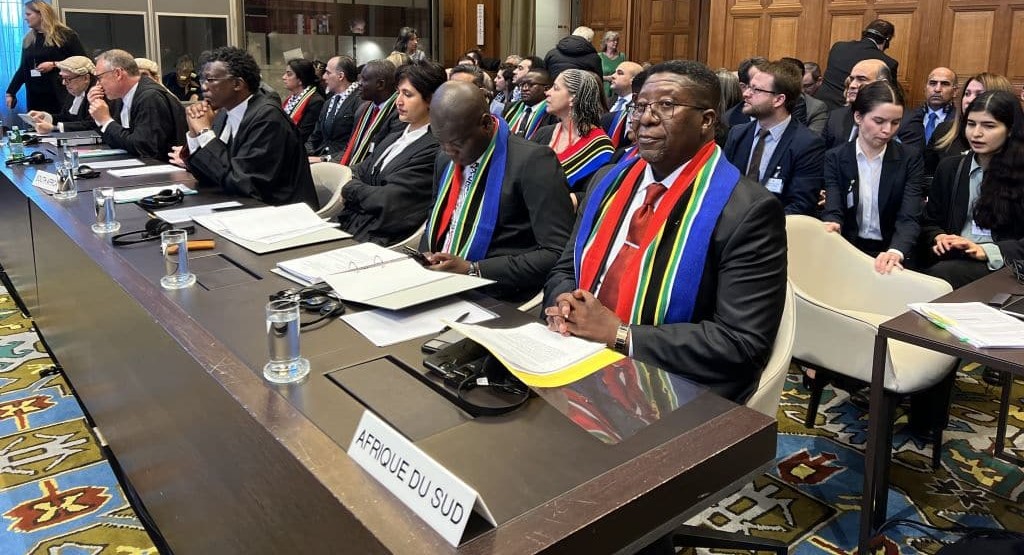
The same lever mechanism is employed more broadly, outside the walls of the court. It’s very likely that this is the first time that the public has witnessed the crime scene before hearing the courts verdict on a genocide case. SA prosecutor Blinne Ní Ghrálaigh took the moment to subtly remind the court’s Judges that the whole world has watched already in horror “This is the first genocide in history, where its victims are broadcasting their own destruction in real time, in the desperate, so far vain hope, that the world might do something”. Global public opinion, and particularly that in western countries, is dramatically skewing against the regimes defending Israel’s actions. In the United States, for example, organizations like Jewish Voice for Peace and Students for Justice in Palestine have rallied thousands of protestors and carried out real civil disobedience as a means of activism. It’s impossible to ignore how much of a role modern communication plays in this shift; global audiences have witnessed an endless stream of content from the source documenting the death and destruction. In past cases, the public would have been waiting for the ICJ’s legal ruling to inform themselves about whether or not the crimes constituted genocide, but it would be reasonable to assume that much of the world is now waiting on the court’s verdict to inform themselves on whether or not the court carried out their stated duty. This means, effectively, that the court’s integrity is on trial and we are all the jury.
Questions surrounding the court’s capacity to enforce its potential ruling also promise to pile on to the legitimacy crisis facing the broader UN. Israeli figures including prime minister Netanyahu have already made it clear the country does not intend to slow its campaign even if the court were to indicate provisional measures. All UN member states are automatically parties to the ICJ’s Statute as per Article 93 of the UN Charter, thus legally bound to the court’s rulings, and this is a primary factor in the optimism surrounding this case in contrast to cynicism regarding the many cold cases on the shelves of the International Criminal Court. The ICC operates on the Rome Statute and is not binding on non-signatories like the United States and Israel, whereas the ICJ’s integration in the UN’s structure makes its jurisdiction more universal. This presents a double edge; while the court’s rulings may be binding, the ICJ primarily depends on the Security Council for enforcement, where it is almost certain that serious efforts will be subject to veto. This would certainly sow doubt over the coherence of the UN superstructure, and considering the world is watching closely, the impotence of the court and the selective application of rule-of-law would not go unnoticed.
South Africa’s ICJ case is not only expertly crafted to directly challenge the court’s historic hypocrisy on Palestine, it’s also clear that SA’s legal team conscientiously structured an argument that would clearly highlight the hypocrisy of the broader United Nations superstructure and invoke questions around the legitimacy of the rules-based liberal world order altogether. Regardless of the court’s ruling on provisional measures today and even of the outcome of the case in the future, South Africa’s prosecution undoubtedly succeeded in making the United Nations Security Council permanent member delegations writhe in their seats: either way the court rules, when this is over, the UNSC and by extension the broader United Nations superstructure and the rules-based international system that it claims to represent will be faced with a significant crisis of legitimacy.
“This is the worlds first live-streamed genocide”
– Omar Barghouti; Activist and Founder of the Palestinian Campaign for the Academic and Cultural Boycott of Israel
Despite the bleak outlook on a concrete ceasefire and the continued horror and suffering for the people of Gaza, it’s important to view the broader impact that this case promises to make in the international system. There are potential victories to be made at every stage of this case.
It’s notable that even just compelling the court to discuss the possibility of provisional measures would set several important precedents which will be relevant in any future international legal discussion on the conflict. The bar for the court to make a prima facie (preliminary or ‘at first sight’) conclusion affirming the courts jurisdiction does not require certainty to be met, but only “plausibility”. South Africa’s legal team made compelling use of the evidence to safely presume that the court won’t deny it. The jurisdiction would be granted to the court based on Article 9 of the Genocide Convention as invoked by SA. A decision from the court to entertain SA’s case for provisional measures would imply the courts legal affirmation of:
- The right of SA to invoke the case and its claim that this is obliged as a signatory of the convention, and by extent, the right and duty of all signatories to do so as well.
- SA’s claim that Palestinians as a whole, as well specifically the Palestinians in Gaza, constitute a “distinct national, ethnic, racial or religious group” and are, as such, protected by the Genocide Convention.
These affirmations are significant milestones for the Palestinian battle in international courts, and promise to set legal precedents which will not be easy to overlook in any future ICJ cases regarding genocide.
Further, the potential indication of provisional measures, even watered down measures, promises to place the court at odds with the Security Council. Israel is likely to ignore the measures based on the dismissive rhetoric that has been piling out of the political leadership since the initiation of the trial. The UNSC’s historic paralysis regarding Israel promises to resurface, with France, the UK, and particularly the US, likely to step in and veto any efforts for concrete pressure on Israel. A failure of the Security Council to enforce the potential provisional measures would be devastating to the effectiveness of the ruling, but also promises to open some doors for productive reform. General Assembly resolution 377 (V), passed in 1950, gives the General Assembly the power to bypass UNSC deadlocks in cases where it “fails to exercise its primary responsibility of maintenance of international peace and security”. Invoking the resolution, through a majority vote by member states, grants the UNGA the right to form an emergency special session. Growing criticism towards the exceptionalism and hypocrisy of the UNSC hints that a majority is quite likely in the General Assembly. Additionally, many western nations who are conventionally allied with Israel have indicated that they will concede to the court’s decision regardless of the outcome, Belgium, Spain, and Slovenia making concrete guarantees.
The GA’s invocation of resolution 377 could give teeth to the ICJ’s potential ruling and would set the stage for possible sanctions and even national criminal cases against Israeli officials. Beyond this, an international dialogue has already been initiated about the reform of the UNSC throughout recent years, and the possible unification of the GA in calling for an emergency special session to address the situation in Palestine is only likely to spark further support for structural changes. These deliberations and their aftermath promise to significantly snowball the existing questions about the “outdatedness” of the Security Council mechanisms, and their hindrance in manifesting equitable international representation. These questions are bound to accelerate the dwindling, if not collapsing, legitimacy of the contemporary order. Now is a critical moment in deciding how we will restructure it from the rubble.
Big changes ahead
The current assault on Gaza has spared no one. Deaths have averaged 250-300 every day due to Israeli aggression alone, 1.5 in every hundred people have been martyred. Everybody has lost someone, some are mourning whole families, and some whole families have been lost without anyone left to mourn them. More than a hundred days of destruction and deprivation promise to leave behind unlivable conditions that will dwarf the current humanitarian crisis. Entire cities have been flattened in the north, leaving nothing for many survivors to return to. With virtually the entire population of Gaza displaced, famine and disease are rapidly overrunning the dangerously congested South. The world cannot bear to watch. Will the international community choose to turn their gaze, or will we rise to the occasion?
Today’s ruling by the court will be critical, not only for Palestine but for the whole of the colonized world. South Africa has not only stepped up to the plate as a protector of the morality and universal human rights which the international rules-based liberal order has touted for decades, but done so as a survivor of colonial genocide and apartheid and in the face of the western liberal democracies who are betraying their claimed values.
The coming days and weeks will be pivotal, and there will be plenty to discuss. Stay updated on the blog for more news, commentary, and reflection on the South Africa vs. Israel trial, and I’m hoping to hear some of our audience’s thoughts so reach out via the blog’s home page or our social media. Keep up with We Decolonize VUB’s Facebook and Instagram to stay updated on events and actions, and don’t hesitate to come and visit us at the new library at Pleinlaan 5.


